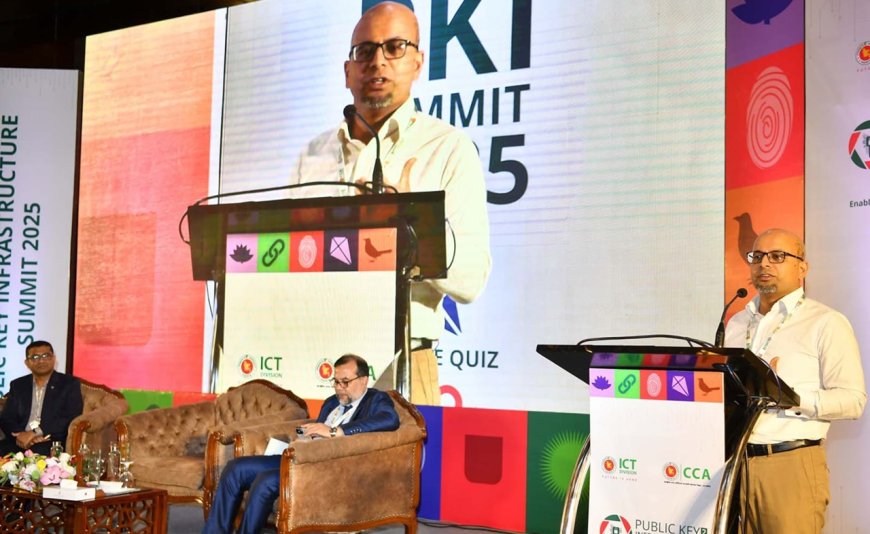Digital Dilemma: Bangladesh Urged to Cut E-Signature Costs and Embrace Cyber Security

Bangladesh continues to lag behind in digital certification adoption, and the situation is worse among senior officials, who often consider cybersecurity expenditures as unnecessary overhead, warned Faiz Ahmad Taiyeb, Special Assistant to the Chief Advisor of the Ministry of Posts, Telecommunications and Information Technology. He emphasized that the country is suffering irreversible losses in its digital economy due to this mindset and called for urgent reforms to reduce the cost of digital certification and signature.
Speaking at the Public Key Infrastructure (PKI) Summit 2025 held at the Pan Pacific Sonargaon Hotel in Dhaka on Thursday, he proposed reducing the cost of digital certificates to BDT 40 and the dongle signature devices to below BDT 3,000. He also mentioned that the government is striving to resolve funding issues for essential technologies such as SSL certificates.

To expand the use of digital signatures across government agencies, Taiyeb suggested that the Controller of Certifying Authorities (CCA) should consider an annual subscription model through Memoranda of Understanding (MoUs) with government departments instead of billing for each certificate or document individually.
"The aim should be to ensure administrative discipline and cybersecurity," he said.
He highlighted a major challenge: the lack of trained personnel and testing capacity to verify physical documents submitted with job applications, which has allowed fake documents to proliferate.
"Every government certificate should be digitally authenticated," Taiyeb stressed.
Citing global best practices, he pointed out that digital verification using AI, blockchain, or national algorithms is standard in many countries.
"If a document lacks a digital signature, it will be rejected. For example, in Dubai's digital ecosystem, applications are often rejected within moments of document upload because their blockchain-based verification software flags inaccuracies," he explained.
"Our businessmen suffer document rejections abroad and call it racism, but the truth is this problem will only intensify. In the future, even scanned documents will no longer be accepted. Every certificate and form we issue must include a digital signature and seal. We are currently exploring cost-cutting models to increase adoption."
Taiyeb noted that Bangladesh has over 4,500 union councils, 12 city corporations, several hundred municipalities, and 57 ministries, each producing numerous documents daily.
"From trade licenses issued by municipalities to certificates from education boards, ministries, medical associations, hospitals, NID authorities, and passport offices — all these must be digitized," he said.
"We lack the manpower to manually verify the certificates submitted. It’s time to take responsibility and reorient our administrative operations towards certified documentation."
He warned that as time progresses, foreign agencies, institutions, and organizations will stop accepting manual certificates altogether, relying instead on automated verification through AI and blockchain.
"Manual documents will no longer be approved, and this issue will only worsen over time. That's why the existence of the CCA is crucial," he concluded.
The seminar was organized by the Office of the Controller of Certifying Authorities (CCA), under the ICT Division, with the aim of raising awareness among the public about innovation, creativity, technological proficiency, and cyber security in the realm of Public Key Infrastructure.
Awards were presented during the event to top users of digital signatures. The Department of Registrar of Joint Stock Companies and Firms (RJSC) and the Ministry of Foreign Affairs received accolades among government entities, while BRAC Bank PLC and Robi Axiata Ltd. were recognized in the private sector. Shahed Alam, Head of Regulatory Affairs at Robi Axiata, accepted the honorary crest on behalf of his organization.
The seminar was chaired by ATM Ziaul Islam, Joint Secretary and Regulator of CCA. ICT Division Secretary Shish Haider Chowdhury, along with representatives from various ministries, financial institutions, private organizations, and educational institutions, attended the event.









































































































































































































